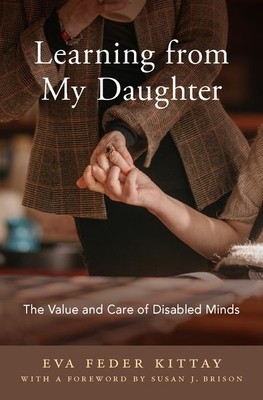
- We will send in 10–14 business days.
- Author: Eva Feder Kittay
- Publisher: Oxford University Press, USA
- ISBN-10: 0190844604
- ISBN-13: 9780190844608
- Format: 16.5 x 23.9 x 3.3 cm, hardcover
- Language: English
- SAVE -10% with code: EXTRA
Reviews
Description
Does life have meaning? What is flourishing? How do we attain the good life? Philosophers, and many others of us, have explored these questions for centuries. As Eva Feder Kittay points out, however, there is a flaw in the essential premise of these questions: they seem oblivious to the very nature of the ways in which humans live, omitting a world of co-dependency, and of the fact that we live in and through our bodies, whether they are fully abled or disabled. Our dependent, vulnerable, messy, changeable, and embodied experience colors everything about our lives both on the surface and when it comes to deeper concepts, but we tend to leave aside the body for the mind when it comes to philosophical matters. Disability offers a powerful challenge to long-held philosophical views about the nature of the good life, what provides meaning in our lives, and the centrality of reason, as well as questions of justice, dignity, and personhood. These concepts need not be distant and
idealized; the answers are right before us, in the way humans interact with one another, care for one another, and need one another--whether they possess full mental capacities or have cognitive limitations. We need to revise our concepts of things like dignity and personhood in light of this important correction, Kittay argues.
an ethic of care, which is the ethical theory most useful for claiming full rights for disabled people and providing the opportunities for everyone to live joyful and fulfilling lives. She applies the lessons of care to the controversial alteration of severely cognitively disabled children known as the Ashley Treatment, whereby a child's growth is halted with extensive estrogen treatment and related bodily interventions are justified. This book both imparts lessons that advocate on behalf of those with significant disabilities, and constructs a moral theory grounded on our ability to give, receive, and share care and love. Above all, it aims to adjust social attitudes and misconceptions about life with disability.
EXTRA 10 % discount with code: EXTRA
The promotion ends in 14d.15:05:24
The discount code is valid when purchasing from 10 €. Discounts do not stack.
- Author: Eva Feder Kittay
- Publisher: Oxford University Press, USA
- ISBN-10: 0190844604
- ISBN-13: 9780190844608
- Format: 16.5 x 23.9 x 3.3 cm, hardcover
- Language: English English
Does life have meaning? What is flourishing? How do we attain the good life? Philosophers, and many others of us, have explored these questions for centuries. As Eva Feder Kittay points out, however, there is a flaw in the essential premise of these questions: they seem oblivious to the very nature of the ways in which humans live, omitting a world of co-dependency, and of the fact that we live in and through our bodies, whether they are fully abled or disabled. Our dependent, vulnerable, messy, changeable, and embodied experience colors everything about our lives both on the surface and when it comes to deeper concepts, but we tend to leave aside the body for the mind when it comes to philosophical matters. Disability offers a powerful challenge to long-held philosophical views about the nature of the good life, what provides meaning in our lives, and the centrality of reason, as well as questions of justice, dignity, and personhood. These concepts need not be distant and
idealized; the answers are right before us, in the way humans interact with one another, care for one another, and need one another--whether they possess full mental capacities or have cognitive limitations. We need to revise our concepts of things like dignity and personhood in light of this important correction, Kittay argues.
an ethic of care, which is the ethical theory most useful for claiming full rights for disabled people and providing the opportunities for everyone to live joyful and fulfilling lives. She applies the lessons of care to the controversial alteration of severely cognitively disabled children known as the Ashley Treatment, whereby a child's growth is halted with extensive estrogen treatment and related bodily interventions are justified. This book both imparts lessons that advocate on behalf of those with significant disabilities, and constructs a moral theory grounded on our ability to give, receive, and share care and love. Above all, it aims to adjust social attitudes and misconceptions about life with disability.


Reviews